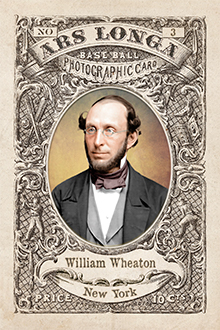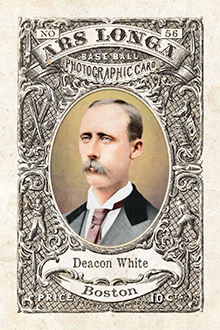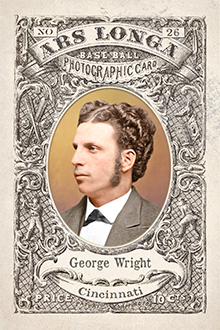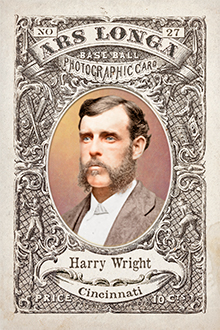- Series: Pioneer Portraits I: 1850-1874
- City: New York
- Team: Knickerbockers
William Wheaton (1814-1888) was an early pioneer of the new game of “base ball.” He was an officer in the Knickerbocker Club and served on its rules committee. According to his own account he may have been the first to codify rules of the game, for the Gotham Base Ball Club in 1837.
- Took time from his law practice to play the new game with business associates
- Received a federal appointment from President Grant, 1876-86
- In ‘87 bemoaned the fast pace of life compared to the days he could while away on the diamond
- John Thorn, official historian of MLB, champions Wheaton as the true “father of baseball”
- Series: Pioneer Portraits I: 1850-1874
- City: Boston
- Team: Red Stockings (NAPBBP)
- League: National Association (NAPBBP)
- Hall: National Baseball Hall of Fame
James Laurie “Deacon” White (1847-1939). Considered the greatest catcher of baseball’s barehanded period (1870s), White eventually moved to 3rd base, played 23 seasons, won 6 championships, and played with a number of the century’s best players on a number of the century’s best teams.
- 1st person to bat in 1st pro league, in 1871, earning a hit – a double
- Reportedly believed the earth is flat
- 2 batting titles; 3 RBI titles
- Elected to Hall of Fame: 2013
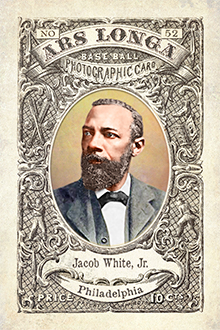
- Series: Pioneer Portraits I: 1850-1874
- City: Philadelphia
- Team: Pythian B.B.C.
- League: Independent
Jacob C. White Jr. (1837-1902) was the son of a preacher in Philadelphia who grew into one of the city's most prominent businessmen. With his friend Octavius Catto, Jake founded and helped lead the Pythians, one of the first and most successful black baseball clubs of its day in America. Catto was the fiery on-field presence that galvanized the Pythians into a force on the national scene as baseball and the country emerged from the darkness of Civil War. But he depended on his childhood pal to help fund the club and give it necessary administration. White had earlier demonstrated the gifts of organization and leadership Catto needed when he took over the Robert Vaux school in 1864, taking it from a damp church basement struggling to help a few dozen black kids to a noted institution whose legacy continues today. Thanks to White's intellectual bent, the Pythians were as unlike the typical white ball clubs of the time as possible. The Club shared quarters with the Banneker Institute, also founded by White. The Pythians were refined gentlemen representing the elite of black society in Philadelphia. They were as interested in scholarly debate, abolition, desegregation and civil rights as they were in playing ball. Catto and White tried to join the National Association of Base Ball Players and, despite the support of the Athletics, were rejected. Eventually, in 1869 the club did get one chance to play a white team, the Philadelphia City Items, and walloped them 27-17.
- White was the promoter of a distincive feature of black baseball in Philadelphia: an all-day celebration of sport and fellowship which invariably ended with a banquet organized by Jake
- When his best friend and partner Catto was assassinated in the lead-up to the 1870 elections, a grieving White stepped away from the game he loved but continued to serve his city for decades
- Series: Pioneer Portraits I: 1850-1874
- City: Cincinnati
- Team: Red Stockings (NABBP)
- League: National Association (NABBP)
- Hall: National Baseball Hall of Fame
George Wright (1847-1937) was considered baseball’s best player while starring for the Cincinnati Red Stockings, the game’s first professional team. He continued to excel at shortstop and at bat for the team his brother Harry moved to Boston in 1871. He co-founded Wright & Ditson Sporting Goods, contributing to tennis, hockey and golf, and built America’s first public golf course. He also fathered two US tennis champions.
- Wright was a seven-time league champion with Cincinnati, Boston and Providence
- Was a consultant on the foundation of the National Baseball Hall of Fame
- Elected to Hall of Fame: 1937
- Series: Pioneer Portraits I: 1850-1874
- City: Cincinnati
- Team: Red Stockings (NABBP)
- League: National Association (NABBP)
- Hall: National Baseball Hall of Fame
William Henry Wright (1835-1895) established professional baseball on the American landscape with his 1869 Cincinnati Red Stockings, a team with which he show-cased the game that was to become the true national pastime. His influence on the sport is incalculable. For 25 years Wright led as player, manager, executive, and chief of umpires. Perhaps his greatest contribution was inspiring true team-spirit. He invented such staples as signals, platooning, hit-and-run, communication among players and a nascent farm system.
- Managed his teams to over 1200 wins, a .581%, winning six championships
- Elected to Hall of Fame: 1953
